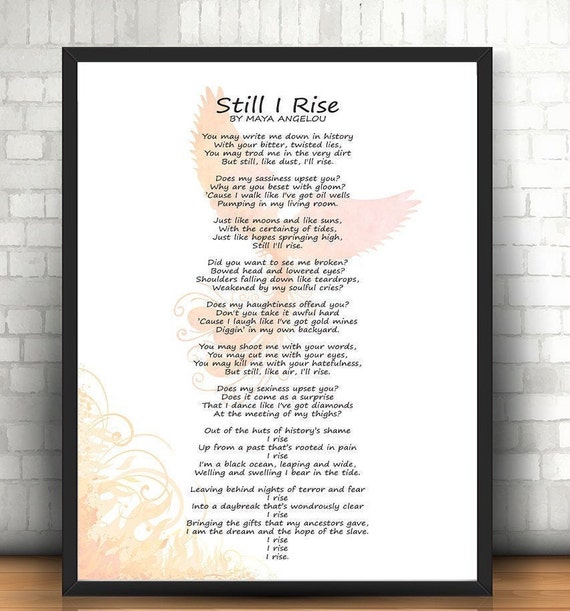
The importance of these three specific elements is that there is surety in their rise. This time, she likens it to moons and suns, which rise every night and morning respectively, as well as the tides, which spring high. Still I Rise | Analysis, Lines 9-12Īngelou once again reiterates that she will rise. Oil and petroleum were known as ‘liquid gold’ at the time, hence the connection between oil wells and richness.

#MAYA ANGELOU STILL I RISE MEANING FULL#
She asks the oppressors whether they are full of gloom “ ’Cause I walk like I’ve got oil wells Pumping in my living room.” This indicates that she walks with the confidence of someone who is extremely rich and set for life. Sassiness is a quality in a woman that is often looked at contemptuously- here, we see themes of womanhood and empowerment as Angelou challenges that notion and implies that it is a quality to be proud of. It is almost as if she is challenging the oppressors, showcasing her positive qualities and suggesting that they are threatened by her. Still I Rise | Analysis, Lines 5-8Īngelou asks a rhetorical question here. She likens herself to dust, because it has the nature of floating above the ground- hence this signifies that though the oppressors will try to drag her to the ground, she will float above them all. But even then, she will rise from their torment. When she says, “ You may trod me in the very dirt”, it holds a figurative meaning- it represents the way the oppressors may attempt to tear down her name and tarnish her image, covering it with dirt. She affirms that this may happen to her, too, citing bitterness as one of the oppressor’s motivating factors to twist her image. She acknowledges the way that, very often, the oppressed and marginalized communities are written into history through a negative lens despite being the ones who had suffered. This establishes a sense of strength from her end, and creates a resilient tone for the piece.

Still I Rise | Analysis, Lines 1-4Īngelou begins with the word ‘You’, showing that she is indeed addressing her oppressors. The repeating phrase- which is what the poem is named after- asserts her main point heavily: that no matter what struggles and injustice is thrown at her, she will stand tall and overcome them. Angelou employs metaphors, symbolism, imagery, repetition and rhetorical questions. The main themes of this poem are defiance against oppression, black identity and pride, racism and struggle, and resilience. The first 7 stanzas follow the rhyme scheme of abcb, while the last 2 follow ababcc. Still I Rise is written in first person narrative, and is directed towards ‘you’, which here means the oppressors- she addresses them directly. She presents herself as a dream, a form of hope for the slaves to look to. In her hands, she will carry the gifts she received from her ancestors. She will leave behind the fearful nights, and she will rise into the clear daybreak. She is like a black ocean, leaping and vast, swelling as she bears the large tide. She will rise from a past that is rooted in pain. Are they surprised at the way she dances so freely, as though she has diamonds on her thighs? She will rise from the shambles of history’s shame. She asks whether they are offended by her haughtiness- don’t they take it hard when they see her laugh so joyfully, as though she has gold mines in her backyard? She tells them that even if they use sharp words to try and shoot her, even if they glare cuttingly at her, even if they try to kill her with hate and spite, she will still rise.Īngelou asks whether the people are upset by her sexiness. With shoulders drooped, weakened by her sorrowful cries.

She will still rise, with the same certainty that the sun and moon and the tides do, with her hopes high.Īngelou asks the people whether they want to see her broken, with her head bowed and eyes lowered, tears welling in them. She asks why they are so upset that she walks with the confidence of one who has oil wells pumping in her room.

She asks the people whether they are offended by her sassy nature. They trod her name into the dirt of the ground, but she will still rise like the dust does. Maya Angelou acknowledges that her image in history may be twisted by the bitter lies of the people who try to oppress her.


 0 kommentar(er)
0 kommentar(er)
